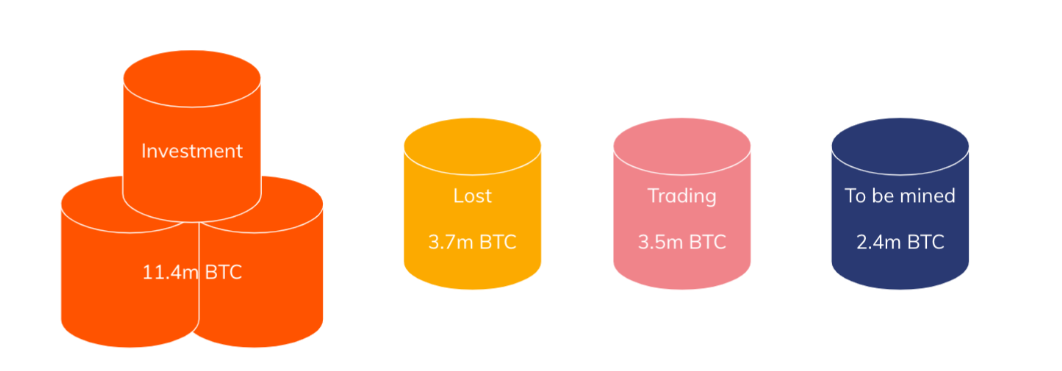
Satoshi Nakamoto said lost Bitcoins “only make everyone else’s coins worth slightly more.” To his credit, it’s hard to disagree.
But how does Bitcoin (BTC) even get lost in the first place? Everyone and their dog knows that backing up your private keys and seed phrase is the first thing you do when you create a crypto wallet. Are Bitcoin users really that careless?
How much BTC has already been condemned to collect cobwebs and dust in inaccessible addresses until the end of time?
Sponsored
In this article, we’ll explore the fate of these lost, but not forgotten, digital assets and their impact on the Bitcoin ecosystem.
Table of Contents
What Happens to Lost Bitcoins?
In the labyrinth of the digital world, lost Bitcoins find themselves in limbo. Until the death of the network itself, misplaced BTC lies dormant on the blockchain, the public ledger that records all Bitcoin transactions.
When Bitcoins are lost, they essentially become inaccessible. This typically happens when the private keys or recovery phrases to a Bitcoin wallet are forgotten, cast aside, or missing in action.
Sponsored
Without these keys, bitcoins are doomed to remain in their respective wallets, untouched and unmovable, like a locked vault whose key has been misplaced.
To rub salt into the wound, these lost Bitcoins are not removed from the total supply count. They continue to exist on the blockchain but are effectively removed from circulation, as they can no longer be spent, sold, or traded.
How Many Bitcoins Are Lost?
Like counting stars in the sky or grains of sand at the beach, counting the number of Bitcoins rumored to be lost forever is no easy task.

Chainalysis, a leading blockchain research firm, speculates that up to 20% of the total supply of Bitcoins may be lost forever. Of course, this isn’t an exact science. According to the firm, any Bitcoin wallet that hasn’t signed a transaction in the last five years is considered ‘lost,’ along with any remaining Bitcoin still inside.
This translates to a rough estimate of around four million BTC, a staggering figure considering that the total supply of Bitcoins is capped at 21 million. As the years go by, the number of lost Bitcoins continues to rise, adding another layer of mystery and intrigue to the enigmatic world of cryptocurrencies.
How Bitcoin Gets Lost
Today, the idea of accidentally losing such a valuable asset seems ridiculous. However, the loss of these digital assets is more common than one might think and can occur in several ways.
Forgotten or Lost Private Keys
The most common cause of Bitcoin loss is people forgetting their private keys or seed phrases, essentially digital passwords granting access to a Bitcoin wallet. If a user forgets these keys or loses the device where the key is stored, the Bitcoins within the wallet become inaccessible.
Death of the Bitcoin Owner
In some unfortunate instances, a Bitcoin owner may pass away without leaving behind the necessary information to access their digital wallet. If this happens, their Bitcoin wallet becomes completely inaccessible.
Hardware Failure or Loss
Bitcoins are often stored in hardware wallets, physical devices designed to store private keys offline securely. However, if these devices are damaged, lost, or stolen, and the owner has not backed up their seed phrase, the BTC stored on the device can be lost.
Sending to Incorrect Addresses
Blockchain transactions are irreversible. If a user accidentally sends BTC to the wrong address, it’s likely that they’ll never get them back. This can happen if a user mistypes the address or their computer is infected with malware that alters the copied address.
Unused Wallets
Some early Bitcoin mining enthusiasts or buyers purchased BTC when it was worth mere cents and then forgot about them. As the value of Bitcoin and other digital currencies, like Ethereum (ETH), rose, some users found they had lost access to their wallets.

The most tragic example of this tells the story of James Howells, who threw away 8,000 BTC after accidentally tossing a hard drive in the trash. Today, this hard drive holds over $250 million worth of Bitcoin, crushed underneath mounds of rubbish in a landfill.
What Does This Mean for Bitcoin’s Price?
Unlike fiat currencies, Bitcoin has a finite supply of 21 million coins. BTC’s scarcity and inflation resistance are critical factors underpinning its value. What happens when a portion of this already limited supply becomes inaccessible?
Let’s go back to Economics 101. In simple economic terms, when the supply of an asset decreases while demand remains constant or increases, the price of that asset tends to rise. Like the Shiba Inu (SHIB) burn mechanism, lost crypto assets are permanently removed from the circulating supply.
As more Bitcoins are lost, the available supply decreases. If demand continues to grow, this could put upward pressure on the price of Bitcoin and fulfill Satoshi Nakamoto’s lost Bitcoin prophecy.
How to Avoid Losing Your Bitcoin
If it was apparent already, safeguarding your digital assets becomes increasingly critical. Here are some strategies to prevent your Bitcoin from becoming part of the lost bounty.
- Back up your private keys and seed phrase – These codes are the lifeline to your digital assets. Store them securely and make sure they are backed up in multiple locations. Consider using hardware wallets, which store your keys offline and are immune to online hacking attempts.
- Keep Wallet Software Updated – Wallet software providers regularly release updates to improve security and fix bugs. Keeping your wallet software up-to-date ensures you have the latest security enhancements.
- Educate Yourself – The world of cryptocurrencies is complex and constantly evolving. Stay informed about the latest security practices, threats, and safe storage options.
- Use a cryptocurrency exchange – If you don’t like the idea of self-custody, crypto exchanges like Binance and Coinbase have additional recovery services that will be familiar to traditional investors.
- Be wary of scams – Hackers and scammers come in many shapes and forms. What do they all have in common? They want your BTC. Learn about potential scams, and never share your private keys or seed phrase with anyone.
- Plan for the Unexpected – Make a plan to ensure your loved ones can access your Bitcoins. Most crypto exchanges offer estate planning and crypto inheritance services.
Is Lost Bitcoin Recoverable?
I hate to tell you this but lost Bitcoin cannot be recovered in most cases. Once the private keys to a Bitcoin wallet are lost, the Bitcoins within that wallet become inaccessible and are effectively lost forever. This is due to the cryptographic security measures inherent in blockchain technology, which make it impossible to access a wallet without the correct private keys.
If you have lost access to your BTC, like you’ve misplaced your hardware wallet or forgotten your password, don’t lose hope! If you’ve backed up your seed phrase somewhere, you can recover your Bitcoin.
Professional data recovery services also attempt to recover lost Bitcoins, especially in cases where a user remembers part of their password or has an old computer or storage device that might contain traces of the lost keys.
While recovering lost Bitcoins in specific scenarios is technically possible, it’s generally a complex and uncertain process. When it comes to securing your digital wealth, prevention is the best defense.
Pros and Cons of Lost Bitcoin
The phenomenon of lost Bitcoin has positive and negative implications for the ecosystem and its users.
Pros
- Increased Scarcity – Lost Bitcoins effectively reduce the circulating supply of the world’s largest digital asset. By the laws of supply and demand, this could potentially drive up the price, benefiting those who hold Bitcoin.
- Security Lessons – The irreversible loss of Bitcoin is a crucial reminder of the importance of security in the digital asset space. It encourages us to adopt better security practices, such as secure storage of seed phrases and private keys.
Cons
- Reduced Market Liquidity – Lost Bitcoins decrease the remaining BTC available for trading. This could potentially boost price volatility, making the cryptocurrency market susceptible to manipulation.
- Threat to Crypto Adoption – The risk of irreversible loss discourages new users. Self-custody is intimidating and can be daunting for people accustomed to traditional financial systems.
- Loss of Value – For the individuals who lose their Bitcoins, the loss can be financially devastating, especially given the increasing value of Bitcoin.
On the Flipside
- If an early adopter wallet that was previously thought to be ‘lost’ were to be recovered, the owner could find themselves holding an immense allocation of BTC. This could have a disastrous effect on the crypto market if they decided to dump all their holdings. Imagine if Satoshi Nakamoto suddenly reappeared and sold 1M BTC?
Why This Matters
Learning about the consequences of losing access to your crypto wallet is the perfect incentive to tighten your own blockchain security and back up your seed phrase. If you haven’t already done it, let this serve as a timely reminder!
FAQs
Lost bitcoins are doomed to sit in their respective wallets forever until someone who holds the keys or seed phrase to the wallet can access them.
If your Bitcoin has left your wallet, it is no longer considered yours. If you were scammed out of your BTC, the only way to get it back is if the scammer decides to give it back to you.
It’s estimated that roughly 4M Bitcoin are lost in inaccessible wallets.
